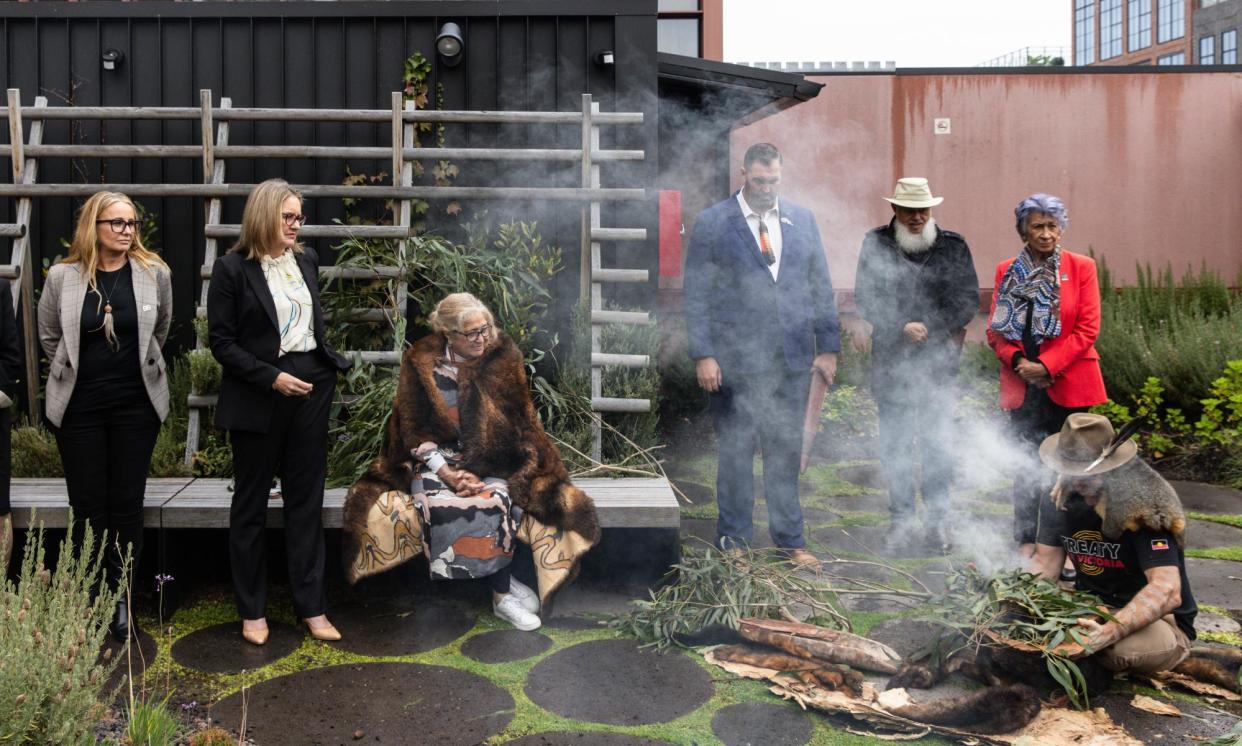Child protection department preparing for ‘likely transfer’ of powers to Indigenous Victorians under treaty

The Victorian department responsible for child protection and housing is preparing for a “likely transfer” of powers to First Nations groups as a result of treaties that will soon be negotiated with the government.
The Department of Fairness, Families and Housing (DFFH) is looking for an organisation to provide training to staff to “increase readiness for treaty”, according to tender documents seen by Guardian Australia.
The government is set to begin treaty negotiations with the First Peoples’ Assembly – the state’s democratically elected Indigenous body – later this year, which the department expects would result in “extensive” changes to its work.
“The expected policy and operational impacts for DFFH will be extensive as making way for self-determination is key to delivering expected treaty outcomes,” the documents read.
“It is essential that DFFH is strategically and operationally prepared for the treaty process including the likely transfer of many state decision-making powers and resources to First Nations communities.”
Related: Victorian police make ‘long overdue’ apology for their role in stolen generations
The training, which about 1,240 staff were expected to receive, was a recommendation of the Yoorrook Justice Commission, which oversees the state’s truth-telling process.
Last year, Yoorrook released a report that recommended a major overhaul of the state’s child protection and criminal justice systems. This included a recommendation that First Peoples have a standalone child protection system, following evidence of systemic racism.
Yoorrook’s deputy chair, Sue-Anne Hunter, said the commission “cautiously welcomes” the department’s move.
“Educating and training department staff about injustice affecting First Peoples is a small step towards the government meeting one of Yoorrook’s 46 recommendations for change,” she said.
“But there is much, much more work to do to address ongoing harms against First Peoples. It is important that other departments act on this recommendation, and all other relevant recommendations in the Yoorrook for Justice report, as a matter of priority.
“Addressing the systemic injustices faced by First Peoples is about creating transformational change for our people.”
Following the 2022 election, then premier Daniel Andrews vowed to overhaul the child protection system and said it was the state’s “great shame” that so many First Nations children were being removed from their families.
Victoria has the highest rate of Indigenous children in out-of-home-care, according to the Australian Institute of Health and Welfare.
In 2023, the government introduced legislation that will empower Aboriginal-controlled organisations to investigate child protection cases and connect families with support before a court order is made.
The DFFH said the training it was seeking for staff should be of a “tertiary” level and cover concepts of “self-determination, sovereignty, nationhood, stolen generations and truth-telling”.
They want the program to “champion Indigenous voices” and “prioritise Indigenous academics and educators”, and issue a recognised qualification – such as a “certificate, diploma or micro-credential” – upon completion.
“The expected outcome is a fundamental shift in individual thinking, that will, in turn, achieve lasting and transformational organisational change within the department,” the document said.
“It is expected that this change will embed self-determination into all policies and practices where there is a direct impact on First Peoples, and where systemically racist policies and practices are able to be identified and rectified.”
The department anticipates 155 staff will take part in the training each quarter across a two-year period, and is open to a 12-month extension.
It confirmed workers from across departments – including child protection and housing – will be included.
But the Coalition’s spokesperson for Aboriginal affairs, Nationals leader Peter Walsh, questioned the value of the training, given the government was yet to reveal what treaty would entail.
“Labor’s track record of wasting valuable public money is again on show,” he said. “These funds could be used to directly assist Indigenous Victorians who need improved access to health, education and housing, but instead they are spending the money on themselves.”
A department spokesperson said the request for tender related to “ongoing training for staff” and it “continues to deliver workshops targeted to leadership and all-staff groups, including frontline workers”.


